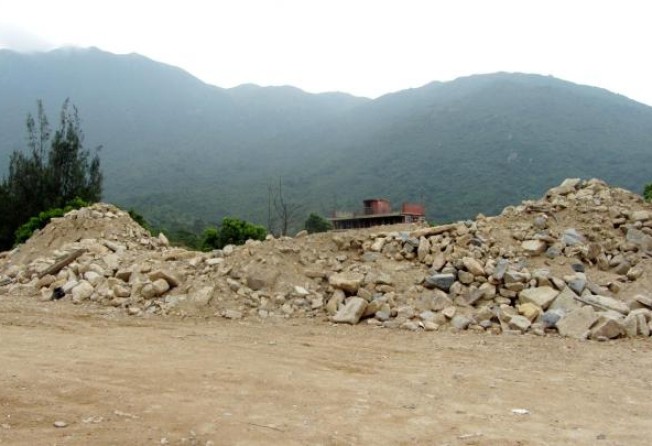Pollution fears over debris and rubble dumped near Lantau river

Green group WWF Hong Kong is concerned about possible pollution of the Tung Chung River after it found tonnes of construction waste had been dumped on nearby farmland.
Construction debris and rubble covering an area bigger than a soccer pitch was found in Shek Mun Kap on Lantau Island on Wednesday, said Alan Leung Sze-lun, conservation manager of WWF Hong Kong.
The construction waste was less than 10 metres from the river, which he said was a "green lung for Tung Chung residents". The group's workers noticed the abandoned waste on Wednesday during a field trip, and toured the area with reporters yesterday.
"What used to be a piece of green land has become a place full of mud and grit," he said. "We're concerned because the run-off from this waste could cause massive pollution of the river, especially on rainy days."
A security guard stationed nearby said the waste belonged to a hospital under construction, but did not specify which. The 180-bed North Lantau Hospital, being built in Tung Chung, is due to be completed by December.
A spokeswoman for the Lands Department said the waste was put on mainly private land, and small parts of government land. The department would take action against those occupying government land, she said.
Leung said the site was not covered in any development permission area plan, so it was vulnerable to such pollution. In June, several green groups, including the WWF, drafted a proposal incorporating their vision on sustainable planning for Tung Chung's remaining natural areas for the government's consideration, but so far no action had been taken, Leung said.
He said he would write a letter to the government over the issue.
"We urge the government to protect the Tung Chung River, its estuary, the entire Tung Chung Bay and other remaining natural habitats within Tung Chung Valley, which are of high ecological, landscape, hydrological and cultural value, so as to preserve natural resources for nature conservation, community use and enjoyment, and preservation of the fisheries," said Leung.